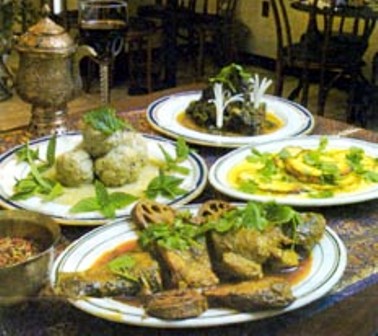Rakib Altaf
SRINAGAR: Kashmir’s famed cuisine Wazwan, a multi-course meal traditionally served to groups of four, is slowly adopting the buffet system.
Introduced over 600 years ago by Muslim missionaries who came to the valley from Central Asia, the usual Wazwan feast begins with passing the Tasht and Naari (copper jug and basin) for washing hands.
Then, laden with meat, Traamis or large copper dishes with intricate carvings are placed in front of the guests.
The Wazwan till the recent past was a course of just more than seven dishes made out of mutton, although it extended up to fifteen in a special banquet for the Baraatis.
With gradual decline in the armed conflict that largely disrupted economic activity in the region, growing affluence among people led to an increase in the number of dishes even in the regular wedding meal.
But that’s not all.
Of late, an increasing number of hosts have been opting to serve guests through a buffet where food is placed on tables and the diners help themselves.
At one such party, a 35-year-old businessman Tariq Andrabi says “Things are changing and so are people.” He says he hardly sees people enjoying all the delicacies on a usual Traami.
“The buffet helps people choose.”
Buffets aren’t new in Kashmir. Most government luncheons and dinners are buffets. But in the ordinary society, the system was not adopted until some families of the upper stratum adopted it to tend to ‘important’ guests who arrived at their own convenience.
This also served well the increasing concerns among the middle class of the society who thought that a lot of food was wasted during weddings.
Manzoor Ahmed who recently hosted a buffet for his son’s wedding says “The guests eat whatever they want and leave the rest untouched.”
“This way we don’t have to throw away the whole thing that they only took a bite from.”
Although buffets are picking up in Kashmir, or say in the capital city Srinagar at least, many believe that the trend will soon discontinue. They say the buffet contradictions the “basic spirit of the Kashmiri feast”.
“You see nowadays everything-the Ristas, Gushtaabas (meatballs cooked in yogurt) and other things are easily available in restaurants. So when we go to a marriage party it is more about social respect than to cherish the food,” says Syed Shameem Andrabi, a government teacher.
For Andrabi that “decorum” is missing when it is a buffet meal.
“Standing in a queue, you know, almost gives a feeling that we are in a charity event where we are being served food.”
Altaf Hussain, a journalist, agrees that the buffet system is not appropriate given the “values and standards in the Kashmiri society”. But he says that can be handled.
“Once I attended function where the host, who was a bigwig, handed out plates to us.” Hussain says this way the ‘decorum’ was maintained and the guests did not feel unimportant.
But even then the buffet is just in its experimental mode in the valley and will take a lot of time to be absorbed into the Kashmiri society.
A buffet system for the ‘all-important’ bridegroom is yet to be tried by anybody.“Even for the women, it is still impossible to think of a buffet for them. They love to sit and talk about things at their own ease. The buffet will rob them of that luxury,” Manzoor Ahmed says laughingly.













Pingback: "buffet" - Buffet praises Bush and Obama for doing 'the right things' on finance